EU monitors began patrolling Georgian territory yesterday under a French-brokered peace deal, facing a Russian military that seemed reluctant to retreat.
The Russian peacekeeping forces said a day earlier they will not immediately allow any of the 300 EU monitors to enter a buffer zone surrounding the separatist South Ossetia region. The statement raised a fresh concern that Moscow was stalling on compliance with a ceasefire agreement reached after the August war with Georgia.
But when a group of EU observers arrived at a Russian checkpoint near the village of Kvenatkotsa at the perimeter of Russia’s so-called “security zone” on Georgian territory, Russians quickly let them enter the area.
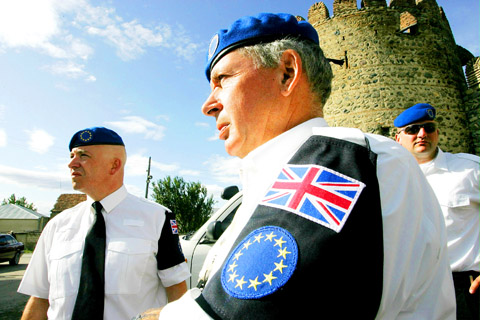
PHOTO: AFP
The Russian soldiers didn’t allow reporters to follow the observers into the buffer zone, but let Georgian civilians pass after examining their vehicles. A small white dog barked at passing cars, and a handful of Russian troops at the checkpoint looked relaxed.
“The situation is very calm,” Ivan Kukushkin, a Russian officer in charge of the checkpoint said.
Another group of EU monitors also visited the village of Odisi in a different sector just outside South Ossetia.
EU mission head Hansjoerg Haber told reporters the Russian military had earlier warned the EU monitors from entering the buffer zone, citing concerns for their security.
“We received different signals,” Haber told reporters. “We want to clarify these differences in the coming hours.”
Russia and Georgia agreed to the EU observer mission as part of an updated ceasefire plan following the war, which ended with Russian and separatist forces in control of the breakaway regions of South Ossetia and Abkhazia. Russian troops also remained deep inside Georgia for weeks.
As part of the deal, Moscow agreed to withdraw its forces completely from territories outside of South Ossetia and Abkhazia within 10 days of the EU monitors’ deployment yesterday — including from a roughly 7km buffer zone they have created southward from South Ossetia’s edge.
Russia still plans to keep around 7,600 troops in South Ossetia and Abkhazia, and has refused to allow EU monitors inside the regions themselves.
But the Russian peacekeeping forces’ statement said, as of Wednesday, the EU monitoring will take place only “up to the southern border of the security zone” pending further consultations.
“Show the flag, be friendly, show confidence,” Haber told monitors near Lake Basaleti, about 20km north of the Georgian capital, Tbilisi.
The EU observers will be based in four semi-permanent locations, including the central city of Gori near South Ossetia and the Black Sea port of Poti, key targets of Russian forces.
In Gori, another group of EU monitors boarded their light armored vehicles to head toward the buffer zone outside South Ossetia.
One observer, Adam Glinsky, a 43-year-old Polish policeman, downplayed Russia’s warning not to enter the buffer zone.
“It’s only yesterday’s opinion, hopefully tomorrow it will be different,” he said.
EU foreign policy chief Javier Solana, who visited Georgia on Tuesday, expressed optimism that Moscow would pull its troops back in the promised time frame.
“I am optimistic that all parties will comply with the agreement that was signed,” Solana said. “We hope very much and we are sure that before Oct. 10 that part of the mission will be completed.”
Georgian President Mikhail Saakashvili skirted questions about EU access at a news conference on Tuesday. He stressed that Georgia wants a complete Russian withdrawal.
“We will not be happy until the last Russian soldier gets out of my country,” he told a news conference with Solana.
The war began Aug. 7 when Georgian troops launched an offensive to regain control of South Ossetia. Russia sent troops, which quickly routed the Georgian military and pushed deep into Georgia.
Russia’s continued occupation of Georgian territory and its subsequent recognition of the independence of Abkhazia and South Ossetia has drawn strong condemnation from the West, which urged Moscow to respect Georgia’s sovereignty.
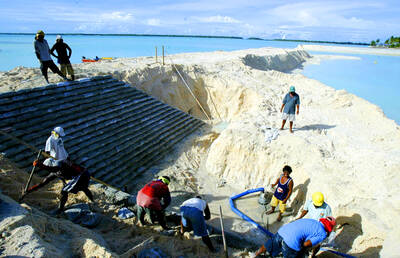
MINERAL DEPOSITS: The Pacific nation is looking for new foreign partners after its agreement with Canada’s Metals Co was terminated ‘mutually’ at the end of last year Pacific nation Kiribati says it is exploring a deep-sea mining partnership with China, dangling access to a vast patch of Pacific Ocean harboring coveted metals and minerals. Beijing has been ramping up efforts to court Pacific nations sitting on lucrative seafloor deposits of cobalt, nickel and copper — recently inking a cooperation deal with Cook Islands. Kiribati opened discussions with Chinese Ambassador Zhou Limin (周立民) after a longstanding agreement with leading deep-sea mining outfit The Metals Co fell through. “The talk provides an exciting opportunity to explore potential collaboration for the sustainable exploration of the deep-ocean resources in Kiribati,” the government said
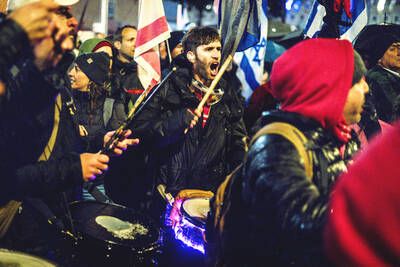
The head of Shin Bet, Israel’s domestic intelligence agency, was sacked yesterday, days after Israeli Prime Minister Benjamin Netanyahu said he no longer trusts him, and fallout from a report on the Oct. 7, 2023, Hamas attack. “The Government unanimously approved Prime Minister Benjamin Netanyahu’s proposal to end ISA Director Ronen Bar’s term of office,” a statement said. He is to leave his post when his successor is appointed by April 10 at the latest, the statement said. Netanyahu on Sunday cited an “ongoing lack of trust” as the reason for moving to dismiss Bar, who joined the agency in 1993. Bar, meant to
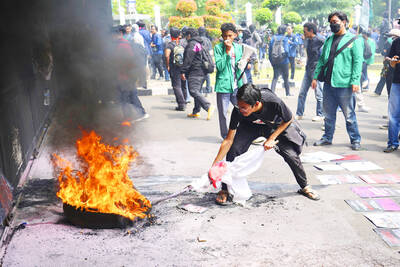
Indonesia’s parliament yesterday amended a law to allow members of the military to hold more government roles, despite criticisms that it would expand the armed forces’ role in civilian affairs. The revision to the armed forces law, pushed mainly by Indonesian President Prabowo Subianto’s coalition, was aimed at expanding the military’s role beyond defense in a country long influenced by its armed forces. The amendment has sparked fears of a return to the era of former Indonesian president Suharto, who ex-general Prabowo once served and who used military figures to crack down on dissent. “Now it’s the time for us to ask the
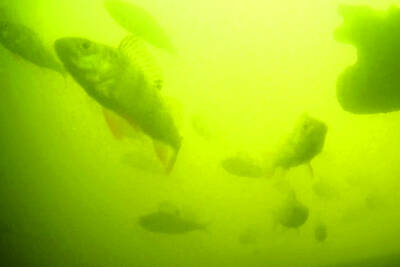
The central Dutch city of Utrecht has installed a “fish doorbell” on a river lock that lets viewers of an online livestream alert authorities to fish being held up as they make their springtime migration to shallow spawning grounds. The idea is simple: An underwater camera at Utrecht’s Weerdsluis lock sends live footage to a Web site. When somebody watching the site sees a fish, they can click a button that sends a screenshot to organizers. When they see enough fish, they alert a water worker who opens the lock to let the fish swim through. Now in its fifth year, the